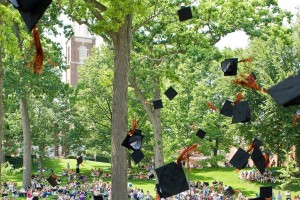
Just as many newly minted Kalamazoo College graduates are heading into the work world, rising K sophomores, juniors, and seniors are venturing into their own workplace adventures. Steeped in a historical commitment to experiential education, the Career and Professional Development component of the K-Plan is now identified with summer “externships” and internships administered by the College’s Center for Career and Professional Development (CCPD).
During summer 2014, 50 rising K sophomores and juniors will explore new career paths as “externs” through the CCPD’s unique Discovery Extern Program that allows students to both live and work with active professionals, including K alumni, for one to four weeks.
Summer 2014 Discovery Externs spend their days alongside professionals in hospitals and health centers, law offices, schools, libraries, businesses, nature centers, and farms, and then they’ll head home together for wide-ranging “porch time” conversations.
CCPD Program Administrator Pam Sotherland has helped nurture hundreds of new connections through the program that began as a pilot in 2001.
“The value of the Discovery Externship Program lies in the opportunity for a student to live and work with an alum and through that experience forge what many participants have said will be a lifelong relationship,” said Pam.
Additionally, the CCPD’s Field Experience Program (FEP) has scores of students enrolled in internships during summer 2014. Whether students identify internships through the CCPD or on their own, all FEP interns learn about a possible career, hone transferrable skills, and build professional networks.
Ogden Wright ’16, from Jamaica, is headed to Pennsylvania to intern at the Delaware County Planning Department with alumnus Justin Dula ’99. Ogden, who plans a career in civil engineering, said he hopes “to learn, from a public sector perspective, how urban planning is organized and implemented, and to gain the knowledge and skills necessary to pursue a career in a governmental organization.”
It’s a big year for K student interns in Washington, D.C.
After working on several political campaigns, Natalie Cherne ’15, from Minnesota, hopes her summer internship in Minnesota Senator Al Franken’s Washington, D.C. office will hone her policy-writing skills.
“By applying my learning from political science classes to writing policy memoranda, taking notes at hearings, and conducting research, I will contribute to making the policies I referred to when talking with voters about issues,” she said.
Noah Arbit ’17, from West Bloomfield, Michigan is interning at the Washington, D.C.-based National Coalition Supporting Eurasian Jewry, a nongovernmental organization working to ensure the safety and nondiscrimination of Jews in the former Soviet Union and Eastern Europe (especially topical given unfolding events in Ukraine).
As soon as Alex Werder ’15 finishes up at his study abroad program in China, he will return to the U.S. to intern in the Washington, D.C. office of New Jersey Congressman Rush Holt.
“Rush is my congressman from New Jersey’s 12th District and I have wanted to work for him since I was old enough to know what politics was all about,” said Alex. “I could not be more thrilled to be going on this adventure this summer.”
Employers, alumni, parents, and friends of the College who would like to learn more about hosting a K intern or extern should contact the Center for Career and Professional Development at 269.337.7183 or career@kzoo.edu.
Story and photo by Joan Hawxhurst, CCPD.






